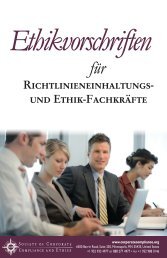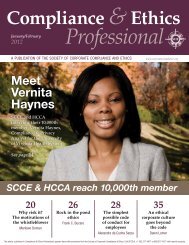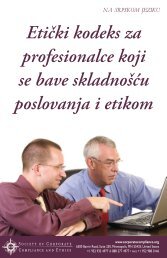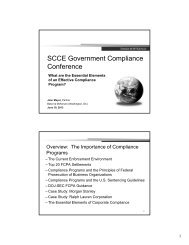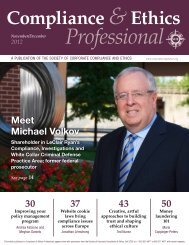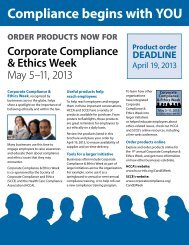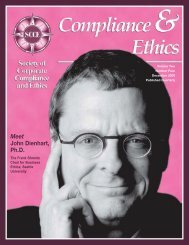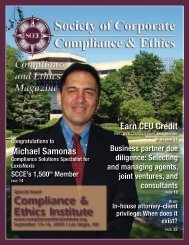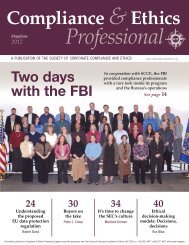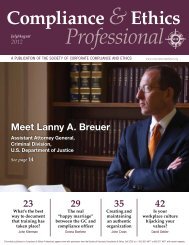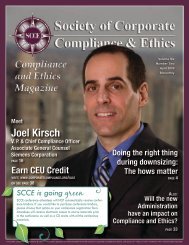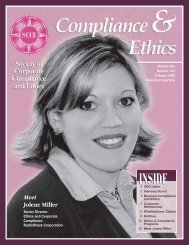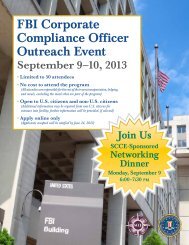Compliance & Ethics Professional - Society of Corporate ...
Compliance & Ethics Professional - Society of Corporate ...
Compliance & Ethics Professional - Society of Corporate ...
- No tags were found...
You also want an ePaper? Increase the reach of your titles
YUMPU automatically turns print PDFs into web optimized ePapers that Google loves.
Kaplan’s Courtby Jeffrey M. KaplanConflicts <strong>of</strong> interest:Where law and ethics meetKaplanIhave long been fascinated by the field <strong>of</strong>conflicts <strong>of</strong> interest (COI) and last yeareven launched a blog devoted entirely tothe topic. What lies behind this interest in asubject that most “normal” individuals wouldfind depressing at best?To begin, COI is an area where,more than any other, law and ethicsmeet. Indeed, many legal fields withwhich compliance and ethics (C&E)pr<strong>of</strong>essionals routinely deal are basedentirely on COI ethical principles(as in the case <strong>of</strong> anti-corruptionlaw) or largely on these principles(as is true for fraud and insider trading law).Additionally, the realm <strong>of</strong> fiduciary duty canbe seen as the legal embodiment <strong>of</strong> ethicalstandards, as reflected in Justice BenjaminCardozo’s justly celebrated words that “[a]trustee is held to something stricter than themorals <strong>of</strong> the marketplace. Not honesty alone,but the punctilio <strong>of</strong> an honor the most sensitive,is then the standard <strong>of</strong> behavior.” 1Studying COIs helps underscore theimportance <strong>of</strong> other areas <strong>of</strong> knowledge, too,for C&E pr<strong>of</strong>essionals. One <strong>of</strong> these is psychology,and particularly, the large number<strong>of</strong> recent studies showing how seeminglyirrational many ethics-related decisions are.Specifically, “behavioral ethics” research hasdemonstrated the counterintuitive fact thatdisclosing COIs actually increases the likelihood<strong>of</strong> wrongful behavior. Yet anotherimportant area <strong>of</strong> knowledge for C&Epr<strong>of</strong>essionals is economics, and the concept<strong>of</strong> “moral hazard” (which can be seen as a“cousin” <strong>of</strong> COIs) helps illuminate the manylinks between incentives and C&E risks.“COI is an area where,more than any other,law and ethics meet.”Finally, proper handling <strong>of</strong> COIs is essentialto a healthy ethical culture which, in turn,can be viewed as “business anthropology”(although this term has other meanings, too).This is because a failure to sufficiently addressCOIs—the most common C&E problem in manycompanies—can undermine employees’ sense<strong>of</strong> “organizational justice,” thereby contributingto an overall erosion <strong>of</strong> its culture. And, to bringus full circle, increasingly the law recognizes theimportance <strong>of</strong> culture to compliance.In short, COIs embrace a broad range<strong>of</strong> knowledge concerning law, psychology,economics, and anthropology that C&E pr<strong>of</strong>essionalsneed for their work. In this sense,studying COIs provides an ongoing—andpr<strong>of</strong>essionally relevant—liberal arts education,which is why I am so fascinated by the field.(More information about all <strong>of</strong> the abovetopics can be found on the Conflict <strong>of</strong> InterestBlog—www.conflict<strong>of</strong>interestblog.com). ✵1. Meinhard v. Salmon, 164 N.E. 545 (N.Y. 1928)Jeffrey Kaplan is a Partner with Kaplan and Walker, LLP in Princeton, NJ.He can be contacted at jkaplan@kaplanwalker.com.<strong>Compliance</strong> & <strong>Ethics</strong> <strong>Pr<strong>of</strong>essional</strong> March/April 2012+1 952 933 4977 or 888 277 4977 | www.corporatecompliance.org 43



